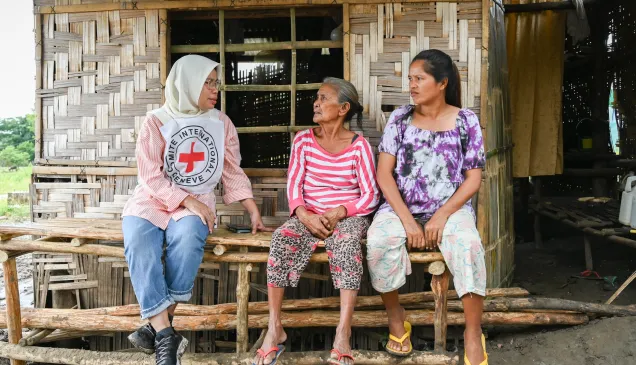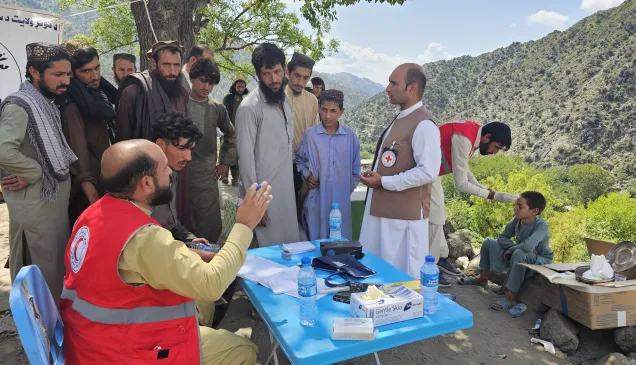Double jeopardy – during and after conflict: The human cost of weapon contamination in Asia-Pacific
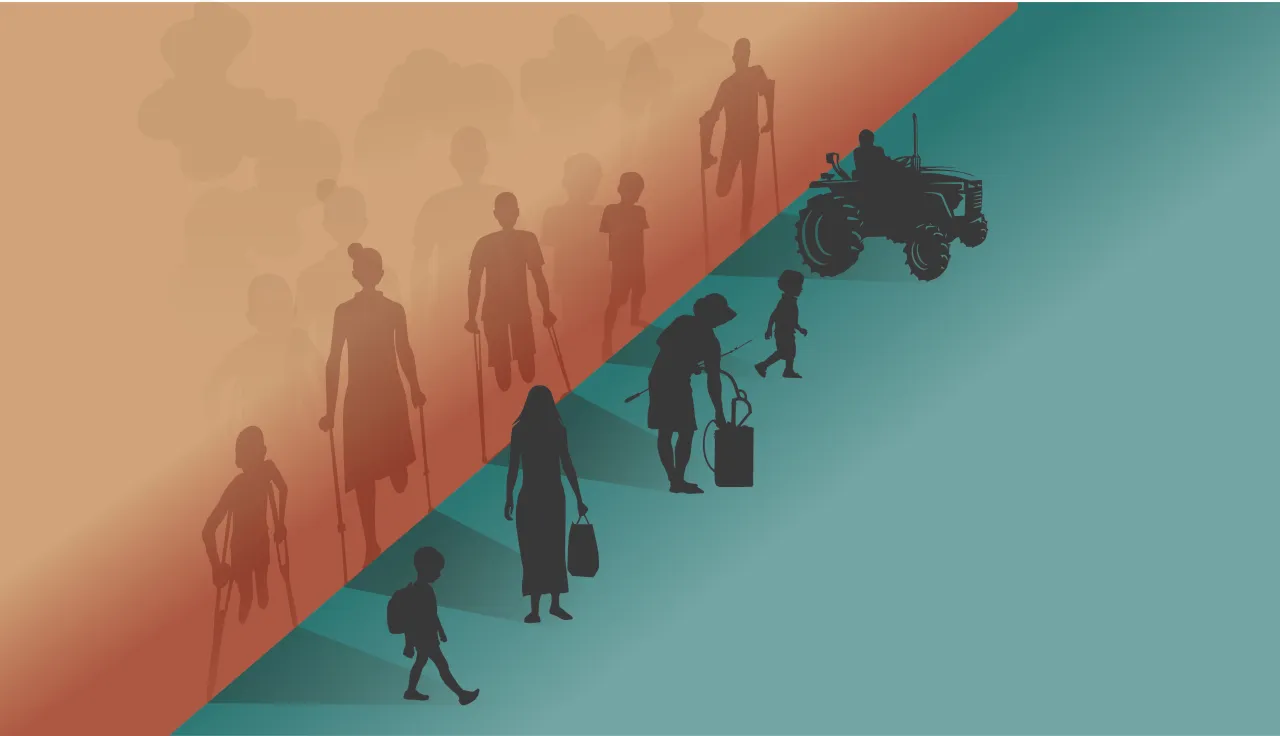
Living in the shadow of conflict
A normal day, a daily chore, a deafening blast, moments of chaos and then a life forever shaken and disrupted – that's how victims of landmine explosions or incidents involving unexploded ordnance would describe what they have endured. For people living in places affected by armed conflict and violence, innocuous activities like a trip to the market, foraging in the mountains, farming or curiously picking up an object on the way to school can turn life-altering because explosive remnants of war litter their living spaces long after active hostilities have ended.
Besides continuing to kill, maim and traumatize thousands of civilians in many parts of the world, landmines and other unexploded ordnance impede access to health-care facilities, destroy critical infrastructure, hamper agriculture and trade, hinder the delivery of humanitarian aid and prevent displaced people from returning home.
To limit such suffering caused by war and protect civilians based on the principle of proportionality in war, international humanitarian law (IHL) requires states and parties to an armed conflict that use explosive munitions or are in control of areas affected by explosive remnants of war to take measures to minimize their risks and effects both during as well as after the end of hostilities.
Underscoring the importance of respecting humanitarian law, we bring to you stories from Afghanistan, Cambodia, Myanmar, Pakistan and the Philippines, of people who give a name and face to the human cost of weapon contamination in the Asia-Pacific region. Having survived incidents involving explosive remnants of war, they talk about battling physical pain, psychological trauma and financial setbacks and then learning to live and hope again with some help.
Afghanistan: Zamanuddin
School days filled with friends, laughter and games used to be the highlight of 12-year-old Zamanuddin's life in Tishkan district of Afghanistan. One day in July 2023, as the sixth-grade student and his friend hopped along to school, they spotted something that looked like a biscuit on their path. Curious, the boys picked up the object and tried to break it to see what it really was. An explosion followed, ripping through both of Zamanuddin's legs and killing his friend.
He talks about being overwhelmed with feelings of despair following the tragic explosion. "I lost my friend and was struck by the harsh reality that I may never be able to go back to school or play with my other friends or even get the chance to tell them about what I had gone through," says Zamanuddin.
In October 2023, following initial treatment in his hometown, Zamanuddin endured a gruelling five-hour journey across 100 kilometres to the Physical Rehabilitation Centre in Faizabad, Badakhshan Province, run by the ICRC. He was fitted with prosthetic legs in March 2024 at the centre and has begun to hope that someday he will be able to walk again. "With the prostheses, I will be able to go around like I did before. It feels incredible to walk again. It's like I am getting back what I lost. I am eager to return to school and play again with my friends," says Zamanuddin, flashing his wide smile.
Abandoned mines and explosives continue to claim and alter lives in Afghanistan as a long-term consequence of decades of conflict.
In 2023, the ICRC recorded a total of 324 incidents involving various types of explosive ordnance that led to fatalities or injuries of 447 children in Afghanistan. These children represent 66 per cent of the year's total civilian casualties from explosive ordnance, which amounted to 673 individuals.
To provide much-needed assistance to the victims of mines and explosives, the ICRC in Afghanistan helped over 206,000 people with disabilities in 2023 with over 133,000 physiotherapy sessions and more than 30,000 prostheses and orthoses to restore their mobility and hope. These services were provided through the seven ICRC-run physical rehabilitation centres in Kabul, Jalalabad, Gulbahar, Faizabad, Mazar-i-Sharif, Herat and Lashkar Gah, helping people with disabilities reintegrate into society, secure employment and lead fulfilling lives.
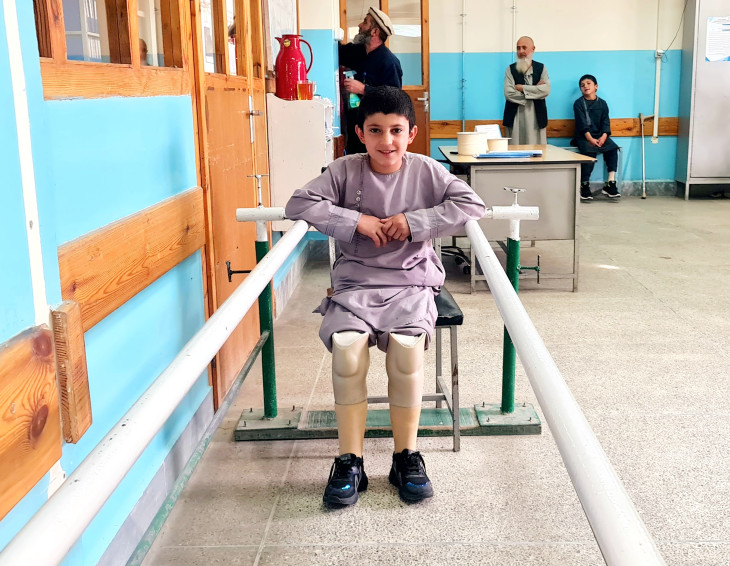
In Tishkan district of Afghanistan, a biscuit-like object exploded and changed Zamanuddin's life. H QADERI/ICRC
Cambodia: Meun Sela
The rugged landscape of Pailin Province, north-west Cambodia, tells the story of a region scarred by years of conflict and strife. Despite efforts by demining organizations, the threat of unexploded ordnance continues to be a constant reality for those who call this land home. But life must go on and so it did for Meun Sela till one day in May 2022 when his world seemed to be torn down. Then 25 years old, Sela was ploughing a field when his tractor struck an anti-tank mine. Bleeding profusely, Sela was trapped under the debris of the mangled tractor.
Because of the muddy terrain, it took a few hours to get Sela to the provincial hospital for emergency care. He was then taken to Battambang hospital to be amputated and had to remain at the hospital for one-and-a-half months before returning to his family. Back at home, with his wife being four months pregnant, the medical bills piled up while the family income dipped.
Sela shares that while the months at home were very stressful for him and his recovery was fraught with physical and emotional challenges, he experienced the unwavering support of his family and community. At the Physical Rehabilitation Centre in Battambang, where he was also fitted with a prosthetic leg, Sela discovered a sense of belonging and purpose among fellow survivors. "It became a community of support for me and that's where I came across the Inclusive Business and Education Hub (IBEH) project of the ICRC. I was referred to the Japan Cambodia Interactive Association (JCIA) for a one-year training programme in machinery repair where I met other people with disabilities suffering from more severe conditions," says Sela.
In early 2024, Sela's training bore fruit and he secured a position as a mine clearer with the HALO Trust and an advocate for community awareness, using his own story to educate others in Pailin, Battambang and Banteay Meanchey provinces about the dangers of mines and unexploded ordnance.
"The skills and opportunities I received from the ICRC and the HALO Trust helped me to find a decent job, earn to support my family and live with dignity. I am so thankful for those opportunities and I am determined to use my experience to create a safer and brighter future for my family and my community," he says.
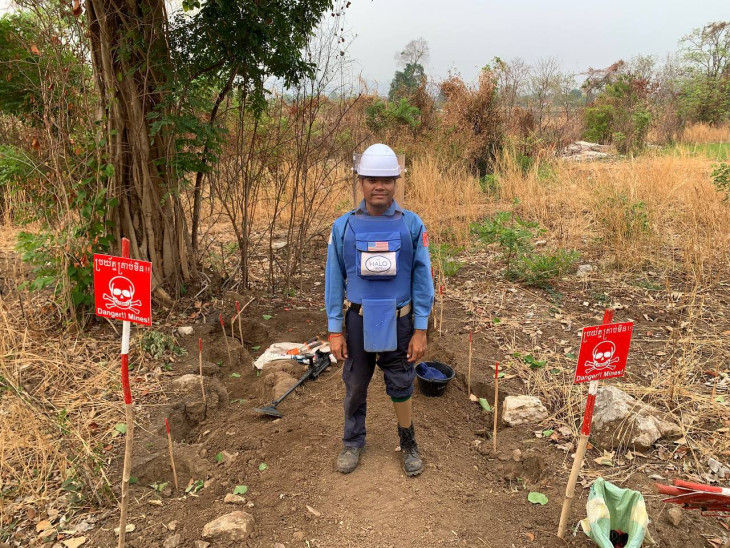
Meun Sela is a mine victim turned mine clearer who aims to create a safer future for his community in Cambodia. HALO TRUST/ICRC
Myanmar: Ma San San Maw
Watching Ma San San Maw at work as a repairperson, tightening screws and fixing prostheses and orthoses for people with disabilities, can be quite interesting. But listening to her story – of surviving a landmine injury, battling depression and then becoming a repairperson who focuses on her abilities rather than her disability – is inspiring.
Back in 2000, Ma San San Maw, who lives in Kawkaraik in Kayin State, Myanmar, used to support her parents by selling bamboo sticks to make sticky rice snacks. A typical day for her meant getting up at 4am and going up to Dawna Hills with her friends to gather bamboo. Three hours later they would return to sell what they had collected. "It was just like other days – my friends and I went up the hills to collect bamboo, but I couldn't collect enough so I decided to go up another mountain alone for more. That's when I stepped on a landmine," she says. Ma San San Maw was sent to the hospital in her town with the help of the Myanmar Red Cross Society and her right leg had to be amputated below the knee.
Through the National Society's support, she also underwent physical rehabilitation at National Rehabilitation Hospital (NRH) in Yangon and received her first prosthesis. In 2003, when the Hpa-an Orthopaedic Rehabilitation Centre (HORC) was set up, Ma San San Maw was referred there as it was closer to her hometown. She recently received her ninth prothesis at HORC.
"I had never expected the sudden and cruel changes the incident caused and I was depressed. But in Yangon, I met other people who had also suffered in different ways and it helped me in my journey to recovery," she says.
In 2016, Ma San San Maw started voluntary work with the Myanmar Disability Society. In 2017, she participated in a two-week repairman training programme that was organized by the HORC and began providing services to those in need of small repairs for their protheses or orthoses. She also refers those who need prothesis or rehabilitation services to the HORC. Ma San San Maw finds ways to encourage people with disabilities.
"Whenever I meet people like me, I tell them to think of what they can still do and pursue it, instead of thinking of what they can't do. We might have lost a leg, but we still have other parts of our body that can be used to create handicraft items or do something else," she says. As a volunteer and then a repairperson she would go to different villages helping disabled people reintegrate in their communities.
"One of my most unforgettable achievements is of helping a person born without legs to start a motor sewing business," she says. With armed conflict breaking out again in and around her hometown, Ma San San Maw says she is unable to go to villages like she used to. However, it cannot keep her from helping people. Even though she had to flee her home for safety, she continues to refer people with disabilities to the HORC for rehabilitation services.
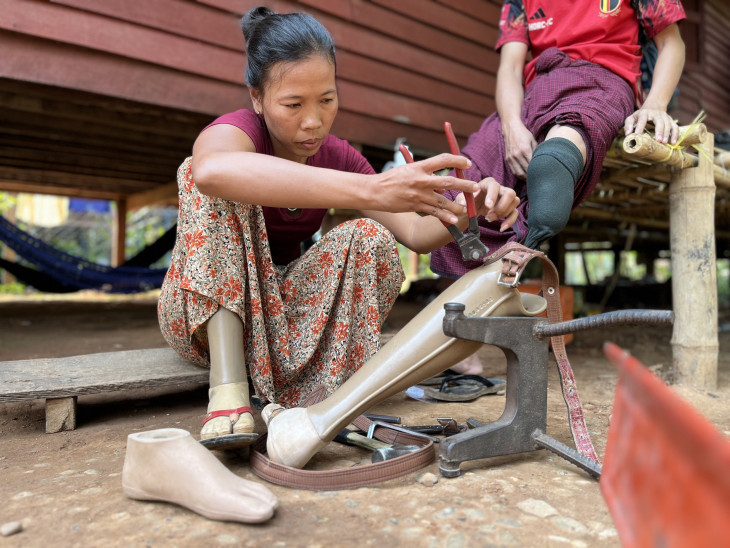
Ma San San Maw has paid a high price for collecting bamboo sticks, yet is inspiring others. Kyaw Kyaw MYO/ICRC
Pakistan: Raqeeb
"I live alone in a boarding institute and I am about to finish high school. I am proud that I can do everything independently with my prosthetic hands," says Raqeeb before getting into the details of his story.
Raqeeb was six years old when a moment of curiosity changed his life. A resident of Kel village, in the picturesque Neelum valley in Pakistan-administered Kashmir, Raqeeb was walking to school on 23 October 2013 when he spotted what he thought was a toy beside the road. It looked like a miniature amplifier, the kind he had seen at school, on street carts and in mosques. When he picked it up the cluster bomb exploded, causing serious injuries to Raqeeb's hands, arms and knees.
He received treatment for his complex injuries first in his hometown and surrounding cities in Pakistan-administered Kashmir and then at a hospital in Rawalpindi specializing in physical rehabilitation. Following the initial treatment, Raqeeb started going to school in Muzzafarabad, the largest city in Pakistan-administered Kashmir. Adjusting to life as a student with a disability in a non-specialized school was not easy. Around the same time, his family approached the Muzaffarabad Physical Rehabilitation Centre (MPRC) for fitting Raqeeb with artificial limbs. The centre was set up with the ICRC's support following the devastating earthquake in Kashmir in 2005.
Because of his young age, Raqeeb's prosthetic devices had to be changed and adjusted frequently to keep pace with his growth. "I have been a regular at the MPRC for the last ten years. The staff are friendly, we play games and stay happy during our treatment. We are also taught how to use our new limbs and become comfortable managing everyday tasks," he says.
An ambitious student and a budding social activist, Raqeeb refuses to let any obstacle hinder his journey of pursuing a law degree. While many students aspire to move to bigger urban cities of Pakistan to pursue higher education, Raqeeb is determined to stay in Muzaffarabad and continue working for the community while he studies.
"I want to motivate young people with disabilities in my community to live full lives. I am able to travel anywhere and frequently go to Islamabad and even Karachi," he says.
Although incidents involving unexploded ordnance have become less common over time, Raqeeb says that last year a young woman lost her legs when she stepped on an object near a market in Kel. Through his journey, he hopes to make people aware of the continuing danger of explosive remnants of war so that they can be safe and inspire them to continue pursuing their dreams even in the face of unprecedented hardship.
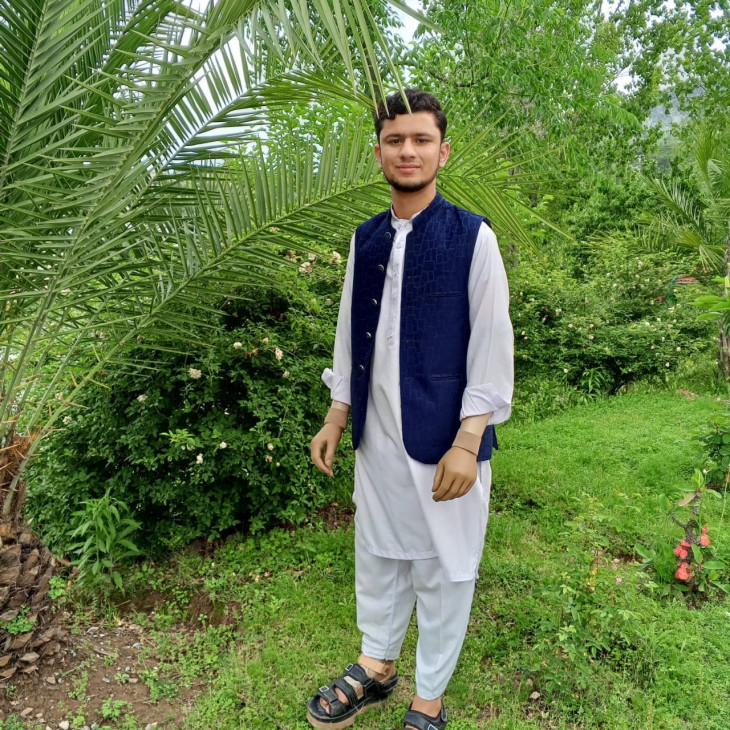
A cluster bomb that looked like a toy caused life-altering injuries to Pakistan's Raqeeb. RAQEEB
Philippines: Jonel Tibayo
Jonel Tibayo remembers the day in 2019 clearly. A 17-year-old farmer from Sultan Kudarat Province in Mindanao, Philippines, he was close to the end of a long day of work. Tibayo only needed to spray pesticides on the rice crops and lead a carabao (water buffalo) to another spot.
Even as an eighth-grade student, Tibayo supported his younger siblings and his mother by farming. Their father had passed away, so he had to step up to be the family's breadwinner. Just as he wrapped up that day, Tibayo stepped on a mound and unknowingly triggered a landmine explosion.
"Where are my legs," were his first words when he regained consciousness. The splinters from the landmine were all over his body and some had even penetrated his bones. Both his legs had to be amputated because of the severity of his injuries. Tibayo remained in the hospital for over a month. Besides forcing him to stop schooling, his hospitalization took a toll on his family's finances.
"All our properties had to be mortgaged to pay for the mounting hospital bills. It reached such a point that we didn't even have enough rice to eat every day," he says. His family eventually learned about the Davao Jubilee Foundation (DJF), an organization supported by the ICRC that provides rehabilitation services and prostheses. After three months of waiting, with the ICRC's support, he flew to Davao to get prosthetic legs and undergo rehabilitation at DJF.
Adjusting to the prostheses was a challenge, both physically and psychologically. When the times got tough, he would reflect on his life. "I wanted to help my family at least eat three meals a day. I dreamed of having my own business or becoming a mechanic. I also wanted to complete my education. That motivated me to accept my new legs and my new reality," he says.
He also drew strength from his family and friends. "They treated me like nothing had changed so that I didn't feel like a burden. But when I struggled to walk, they started carrying me on their shoulders to help me go wherever I needed to. They would also help me if they saw me carrying heavy loads," says Tibayo.
Now used to his prostheses, Tibayo says the artificial limbs have helped him to get back to work and even resume his education. "I help process corn and coal production. Though I cannot stand for long stretches, I also help with small chores at home. I am grateful to everyone who helped me get thus far," he says.
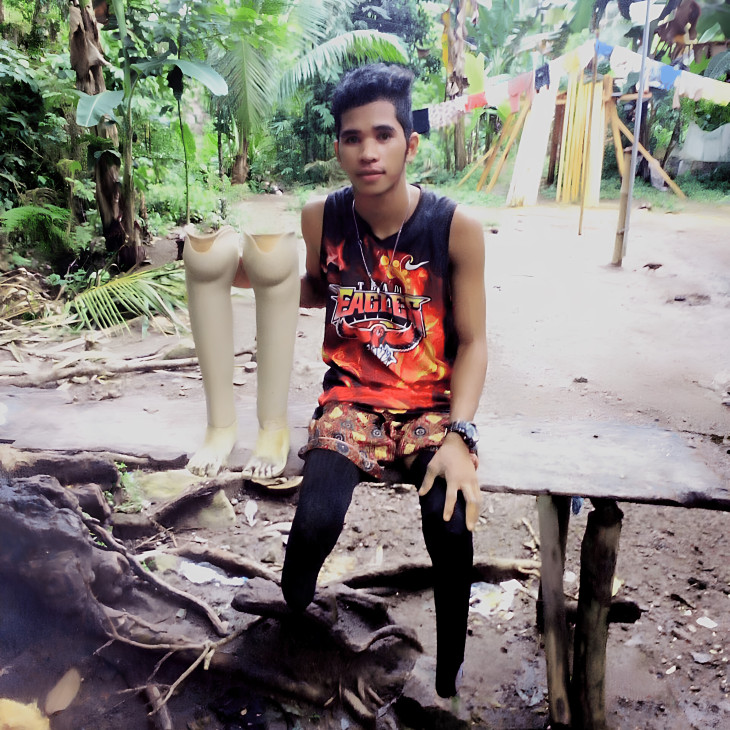
Philippines' Jonel Tibayo lost his legs to a landmine explosion while farming and faced severe trauma. ICRC
Asia and the Pacific is often viewed as a relatively safe region with fewer armed conflicts compared with other regions. However, this perception can be misleading as it overlooks the significant number of casualties caused by landmines and explosive remnants of war from current and past conflicts. At least seven countries in the Asia-Pacific region are grappling with the presence of newly laid anti-personnel mines.
For the detailed interview and a comprehensive report on the impact of weapon contamination in Asia-Pacific, please download:
How does the ICRC address weapon contamination?
The International Committee of the Red Cross (ICRC) witnesses the devastating effects of explosive ordnance as part of its exclusively humanitarian work in active armed conflicts and in post-conflict situations and is working to reduce the risk of weapon contamination. We have programmes that focus on protecting lives and restoring the livelihoods of those who have been affected by legacy contamination, including anti-personnel mines, cluster munitions and explosive remnants of war. Our teams that work in the field of mine clearance and ordnance disposal also hold sessions to raise awareness among communities about risks and safe practices. The ICRC also endeavours to prevent suffering by promoting and strengthening international humanitarian law and universal humanitarian principles.

